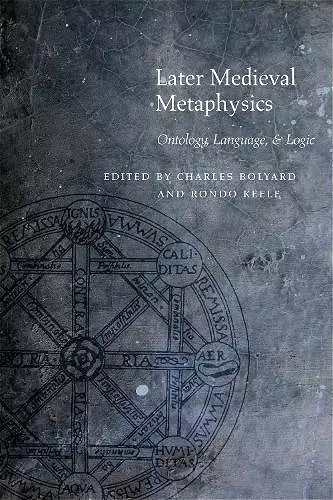Later Medieval Metaphysics
Ontology, Language, and Logic
Charles Bolyard editor Rondo Keele editor
Format:Paperback
Publisher:Fordham University Press
Published:28th Jan '13
Currently unavailable, and unfortunately no date known when it will be back
This paperback is available in another edition too:
- Hardback£83.00(9780823244720)

Provides an emphasis on metaphysics broadly conceived
This multi-author work focuses primarily on 13th and 14th century Latin treatments of the most important metaphysical issues of the day. Though standard ontological topics are covered in detail—e.g., existence, universals, form, and accidents—there is also an emphasis on metaphysics broadly conceived to include epistemology, language, and logic.
The multi-author Essays in Later Mediaeval Metaphysics focuses primarily on 13th and 14th century Latin treatments of some of the most important metaphysical issues as conceived by many of the most important thinkers of the day. Thomas Aquinas, John Duns Scotus, William of Ockham, Walter Chatton, John Buridan, Dietrich of Freiburg, Robert Holcot, Walter Burley, and the 11th century Islamic philosopher Ibn-Sina (Avicenna) are among the figures examined here.
The work begins with standard ontological topics—e.g., the nature of existence, and of metaphysics generally; the status of universals, form, and accidents. Here, a number of questions are considered. What is the proper subject matter of metaphysical speculation? Are essence and existence really distinct in bodies? Furthermore, does the body lose its unifying form at death? Can an accident of a substance exist in separation from that substance? Are universals real, and if so, are they anything more than general concepts?
There is also an emphasis on metaphysics broadly conceived. Thus, discussions of theories of mediaeval logic, epistemology, and language are added to provide a fuller account of the range of ideas included in the later mediaeval worldview. Many questions are raised in this context as well. What are the objects of propositional attitudes? How does Aristotelian logic stand up against modern predicate calculus? Are infinite regress arguments defensible in metaphysical contexts? How are the notions of analogy and equivocation related to the concept of being?
Contributors include scholars of mediaeval philosophy from across North America: Rega Wood (Indiana), Gyula Klima (Fordham), Brian Francis Conolly (Bard College at Simon’s Rock ), Charles Bolyard (James Madison), Martin Tweedale (emeritus, Alberta), Jack Zupko (Winnipeg), Susan Brower-Toland (St. Louis), Rondo Keele (Louisiana Scholars’ College), Terence Parsons (UC-Irvine), and E. J. Ashworth (emeritus, Waterloo).
"This collection will appeal to all students of medieval, late medieval, and early modern philosophy... Recommended." -Choice "Later Medieval Metaphysics contains a number of excellent studies by some of the leading scholars in the field. These studies will engage and stimulate both specialists and advanced students not only of medieval metaphysics but also of medieval philosophy of mind, philosophy of language, and logic." -- -Andrew Arlig Brooklyn College "[This volume] represents the highest standards and the most recent scholarship on this topic, one which was vital to all medieval thought, in particular, theological doctrinal controversies, and has close connections with contemporary metaphysical issues." -- -Stephen Read University of St. Andrews
ISBN: 9780823244737
Dimensions: unknown
Weight: unknown
328 pages